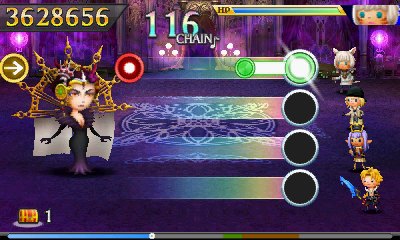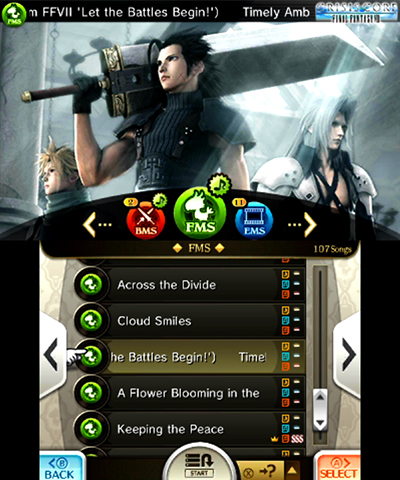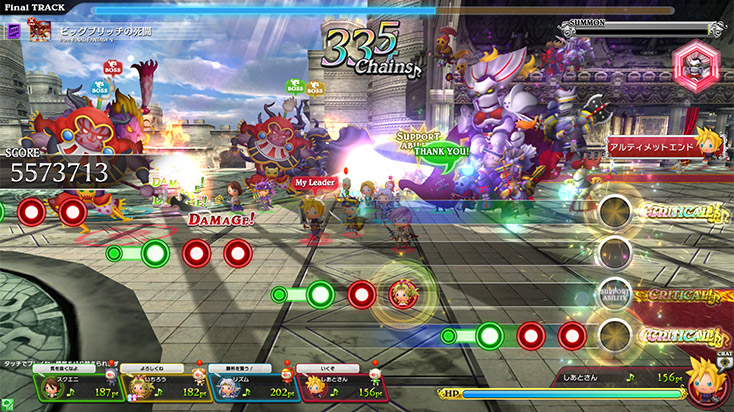We don't have a section of this feature devoted to Final Fantasy's musical history, in part because the series' discography is monolithic in scope, and would really need its own full feature to properly delve into the nuances.

We'd be remiss, however, not to discuss Theatrhythm: Final Fantasy, a rhythm game that has spawned a couple follow-ups and collects music from not only Final Fantasy's long history but plenty of familiar Square Enix (and Squaresoft) games as well. The first game debuted on the 3DS in early 2012 and came bundled with 70 tracks, while another 52 released across several months as DLC.
Later in that same year, Square Enix brought the game to iOS with a different payment structure. Instead of charging $40 and bundling music with optional DLC, it was a free app with 2 bundled songs, with all other music available for 99 cents each. Depending on one's musical interests, this was either a better or worse deal, financially, as buying every available song would make the iOS version cost substantially more in the end. That aside, the iOS version was notable for having a handful of songs not available on 3DS, such as tracks from Final Fantasy Tactics and XIII-2. The superior resolution of iOS and capacitive touch screen (compared to 3DS' resistive style) should have been signs of success, but unfortunately, the iOS version was quietly discontinued and removed entirely from the App Store on September 30, 2017.

What did prove fruitful, however, was the 3DS sequel, which bowed in 2014. Theatrhythm Final Fantasy: Curtain Call includes even more songs and characters, debuted a versus mode, additional gameplay elements, and upped the ante in its RPG elements. Not only does the initial game include 221 songs, another 100 are available as DLC, for a staggering 321 playable songs in total. Curtain Call went much further beyond the mainline Final Fantasy titles as well, including music from Crystal Chronicles, Final Fantasy VII: Advent Children, the first two Dissidia games, and Final Fantasy X-2 and XIII-2. Seemingly deciding this wasn't enough, dozens of tracks from other Square games are available too, from Chrono Trigger to Mana, Bravely Default, NieR, and a smorgasbord of music from SaGa. It's hard to overstate the level of included content and refinement Curtain Call offers, and Stephen does his best in our Curtain Call review to show how this is the definitive version of the game.

Curtain Call was meant to wrap up the Theatrhythm Final Fantasy series, until Theatrhythm Final Fantasy All-Star Carnival was announced for Japanese arcades. Like Dissidia Final Fantasy in its arcade version, additional content unlocks over time and as players progress. While All-Star Carnival does not rival Curtain Call's 321 songs, the song list so far does include several new additions to the series, such as music from Final Fantasy XIV: Heavensward, Final Fantasy XV, Mobius Final Fantasy, Final Fantasy Record Keeper, and even the aforementioned arcade edition of Dissidia. In addition, All-Star Carnival really takes advantage of the increased horsepower and screen real estate compared to its 3DS forefathers, sometimes featuring dozens of characters and enemies on screen at once. It's the same essential gameplay, but the wider scope makes it feel more cinematic, giving this edition a unique feel. Arcades in North America are certainly not what they once were, presuming you can even find one near you, but they're still very much alive and well in Japan. If you're lucky, maybe you have an arcade nearby that imports Japanese machines (I do, amazingly). The arcade machine has a custom and interesting control interface, and it's worth experiencing if you're able. For everyone else, even though it would lack said custom controls, hopefully All-Star Carnival will follow in Dissidia Final Fantasy NT's footsteps and get ported to consoles. It would be right at home on PS4 and Switch, I'm just saying...

